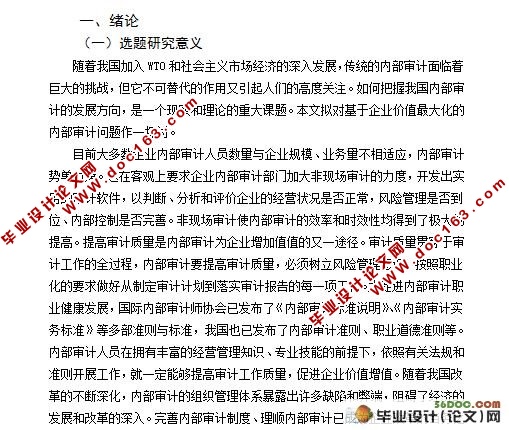基于企业价值最大化的内部审计研究

基于企业价值最大化的内部审计研究(10000字)
摘 要:20世纪90年代以来,为适应经济运行模式和企业治理结构的变化,国内外各种机构的内部审计都在积极寻求变革。国际内部审计师协会(IIA)(2001)在最新的内部审计定义中指出:“内部审计是一种独立的、客观的保证工作与咨询活动,它的目的是为机构增加价值并提高机构的运作效率。它采取规范化、系统化的方法来对风险管理、控制及治理程序进行评价,提高它们的效率,从而帮助实现机构目标。”这一定义标明内部审计进入了一个新的发展阶段---价值最大化阶段,这一阶段强调内部审计工作应从风险管理、控制、公司治理入手,通过评价和改进风险管理、控制和治理过程中的效果,以确保揭露组织潜在的风险和有效果、效率、经济地达到为组织增加价值和改进经营的目的。 由此可见,内部审计已经扩展为融公司治理、风险管理和内部控制审查于一体的综合管理审计,实现价值最大化的新功能。
关键词:风险管理;内部控制;公司治理;内部审计;企业价值最大化
Study on the Internal Audit Based on the Maximization of Enterprise Value
Abstract: Since the nineties of the 20th century, in order to adapt to the economic operation mode and corporate governance structure change, domestic and foreign institutions of internal audit are seeking reforms actively. The international institute of internal auditors (IIA) (2001) in the latest definition of internal audit said: "the internal audit is affirmance and consulting activities with independent and objective, aim to increase value and the improvement of the organization's operations. It takes the application system, standardize the method, evaluation and improvement of risk management, control and management of the process, its goal that organization." This definition stand for internal audit coming into new stage—the maximization of enterprise value stage, this stage emphasize internal audit must be start with risk management、internal control and corporate govemance, via revalue and improve those factors to insure exposing the potential risks for the organization, and to add value and improve for business purpose with effect 、efficiency and economic. Thus, the internal audit’s new function has expanded to blend corporate governance and internal control and risk management review in an integrated management audit, realize the value to maximize.
Keywords: Risk management ; Internal control ; Corporate governance ; Internal audit; The maximization of enterprise value

目 录
摘要………………………………………………………………………………1
关键词……………………………………………………………………………1
一、绪论……………………………………………………………………2
(一)选题研究意义……………………………………………………2
[资料来源:http://www.doc163.com]
(二)国内外研究现状…………………………………………………………3
1国外研究状况……………………………………………………………3
2国内研究现状……………………………………………………………3
(三)综合评述…………………………………………………………………4
二、内部审计以企业价值最大化为目标的意义……………………………………5 [来源:http://www.doc163.com]
(一)是解决企业信息不对称的有力措施……………………………………5
(二)是创造公司价值的内部重要载体………………………………………5
(三)对促进内部控制有重要意义……………………………………………5
1可以监督内部控制的运行,评价其完整、合理、有效 ………………5
2可以提供管理咨询,健全内部控制………………………………………6
(四)对企业在风险管理方面有重要作用……………………………………6 [来源:http://www.doc163.com]
1能够客观地、从全局的角度管理风险……………………………………6
2控制、指导企业的风险策略………………………………………………6
3内部审计部门的建议更易引起重视 ……………………………………6
(五)可以帮助改变传统的审计观念…………………………………………7
三、内部审计在实现企业价值最大化目标时面临的问题…………………………7
(一) 价值取向存在偏差………………………………………………………7
(二) 员工积极性不高…………………………………………………………8
(三)增值职能与监督职不能很好的融合……………………………………8
(四) 内部审计部门的组织结构不合理………………………………………8
(五)内部审计人员的综合素质不高…………………………………………9
四、对于内部审计促进企业价值最大化目标的建议………………………………9
(一)树立正确的价值取向……………………………………………………9
(二)提高员工的积极性………………………………………………………9 [资料来源:http://Doc163.com]
(三)坚持财务审计和绩效审计的统一………………………………………10
(四)建立和完善集团内部审计组织架构……………………………………10
1建立审计委员 …………………………………………………………11
2取缔财务审计联席会议,集团审计委员会代行其职责………………11
(五)加强保证性服务,实现企业价值最大化………………………………11
五、结束语………………………………………………………………………… 12 [资料来源:http://Doc163.com]
参考文献 ……………………………………………………………………12
致 谢…………………………………………………………………………………13
